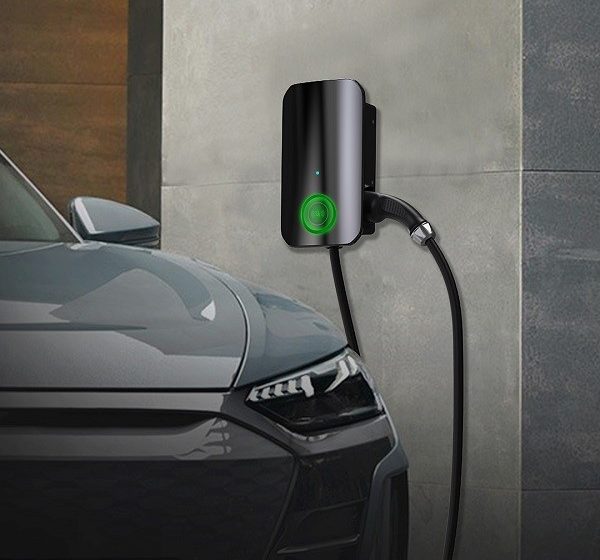Understanding Home EV Chargers: How Many Amps Do You Need?

In the current landscape of electric vehicles (EVs), workplace charging stations, commercial areas, highways, and gas stations have all adopted Level 2 commercial EV chargers or DC fast charging stations to facilitate EV owners in charging their vehicles. To make the charging experience more convenient and efficient for EV drivers, many EV charger distributors are coming up with innovative home EV charging solutions. Many electric car drivers want to install a level 2 EV charger at home. In this comprehensive blog, we will delve into the current and power of home EV chargers, assisting you in making an informed decision when choosing a suitable home EV charger.
How Many Amperes Do Home EV Chargers Typically Use?
Home EV chargers typically operate at 32 amperes. Generally, the current for Level 2 home chargers ranges from 12 amperes to 48 amperes. For instance, Joint’s AC EV chargers usually come in 16, 32, 40, and 48 amperes, with 32 amperes being the most commonly supported for home use.
The specific amperage depends on the charger’s design specifications and the electrical standards of the region. When uncertain, consulting the technical specifications and user manual provided by the EV charger distributor can help determine the amperage.
What is the power of a 16 amp EV charger?
The concept of amperage is closely related to the measurement of current, and the amperage of a home EV charger depends on the design and power of the charger, which directly affects the speed and efficiency of charging. There is a formula involved here: P=VI, where P is the power (watts), V is the voltage (volts) and I is the current (amps).
For a 16 amp electric car charger, we can use the power (watts) formula:
In the UK, the standard domestic voltage is 230 volts, so the power is: Power = 16 amps x 230 volts = 3680 watts Power = 16 amps x 230 volts = 3680 watts
In the USA, the standard household voltage is 240 volts, so the power is: Power = 16 amps x 240 volts = 3840 watts Power = 16 amps x 240 volts = 3840 watts
So a 16 amp electric car charger will have a power of 3680 watts (approx 3.7kw) at the standard UK domestic voltage and 3840 watts (approx 3.8kw) at the standard US domestic voltage.
So when you are buying a domestic electric car charger you will find that the product specification for the 3.8kw level 2 domestic electric car charger is 16A/3.8KW and you will find that this product is typically used in North America.
How long does it take to charge a Tesla mode Y?
Assuming a 32-ampere home EV charger, the charging time for a Tesla Model Y (with a battery capacity of 78.1 kWh) can be calculated using the formula:
Charging Time = Battery Capacity / Charger Power
For a 32-ampere charger:
Charging Time = 78.1 kWh / 32 amperes ≈ 2.44 hours
Therefore, using a 32-ampere EV charger would take around 2.44 hours to charge a Tesla Model Y. This is a theoretical value, and actual charging time may be influenced by factors such as the battery management system and charger efficiency.
How much does it cost to charge a Tesla Model Y?
For a Tesla Model Y, assuming a charger power of 11 kW (11,000 watts) and a charging time of 7.1 hours, the charging cost can be calculated using the formula:
Charging Cost = Charger Power × Charging Time × Electricity Cost
Assuming an electricity cost of £0.29 per kWh:
Charging Cost = 11 kW × 7.1 hours × £0.29/kWh ≈ £22.68
Hence, the charging cost for fully charging a Tesla Model Y would be approximately £22.68.
How to Choose a Suitable Home EV Charger:
Evaluate Your Home’s Power Capacity:
Before choosing the right solution for your electric vehicle, it’s crucial to assess your home’s electrical capacity. Check the rating of your electrical service panel’s main circuit breaker, measured in amps. This rating indicates the maximum amount of electricity your home can handle. Common residential circuit breakers are rated at 100 A, 150 A, or 200 A. If you’re unsure of your home’s electrical capacity, you can consult a professional electrician or even a professional EV charger supplier.
Match Charger Power:
Home EV chargers come in various power levels, ranging from 3 kW to 22 kW or higher. Choose a charger that matches your home’s power capacity and the charging needs of your vehicle. If your vehicle supports faster charging, consider selecting a higher-powered home charger.
Consult Reliable EV Manufacturers:
Collaborating with reliable manufacturers like Joint is essential when selecting a home EV charger. Joint offers a range of high-quality and efficient home EV chargers with power options suitable for various home electrical capacities. By consulting Joint, you can make an informed decision to ensure seamless and optimal charging for your electric vehicle at home.
Conclusion:
By evaluating your home’s electrical system, calculating charging power, and considering your charging needs, you can make informed decisions when choosing a home EV charger. If you are looking to purchase a home EV charger, consider Joint’s products, and ensure a seamless and efficient charging experience for your electric vehicle at home.

Software Testing Lead providing quality content related to software testing, security testing, agile testing, quality assurance, and beta testing. You can publish your good content on STL.




